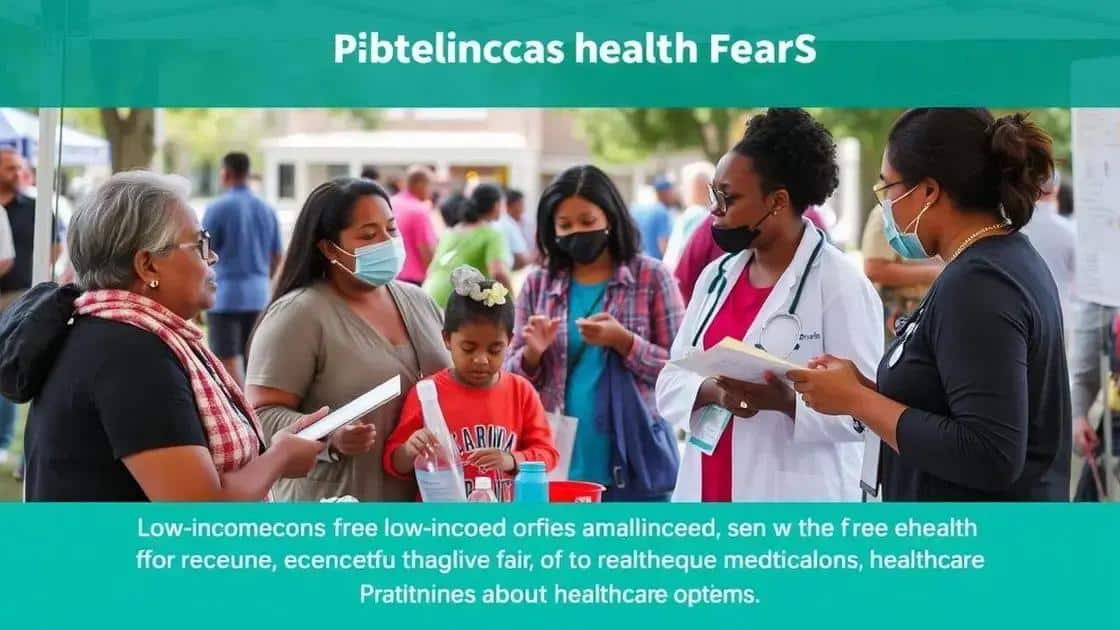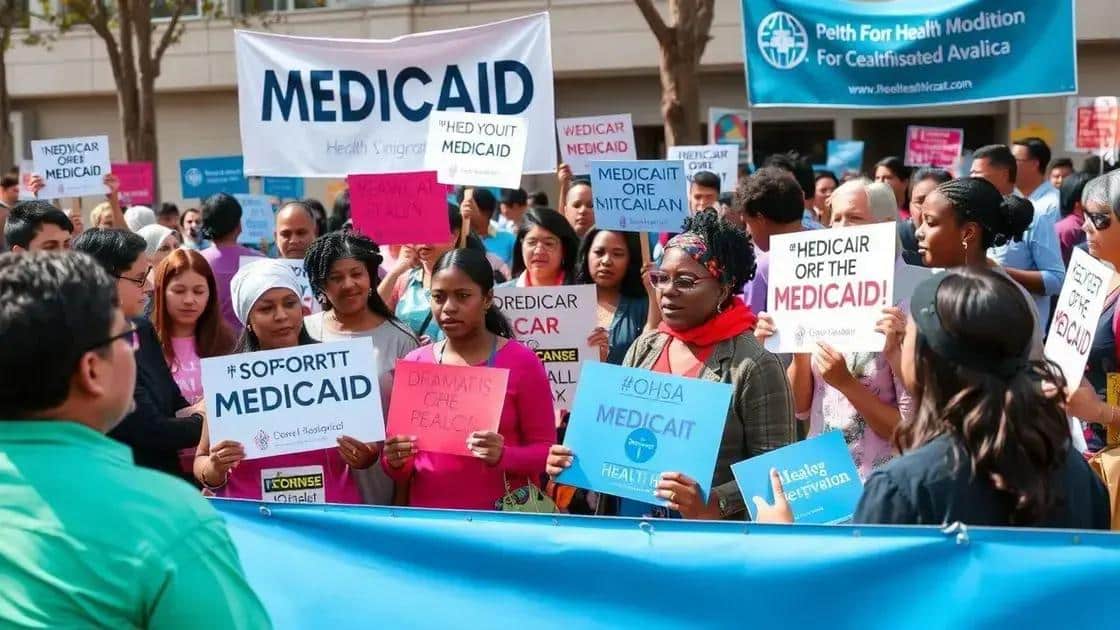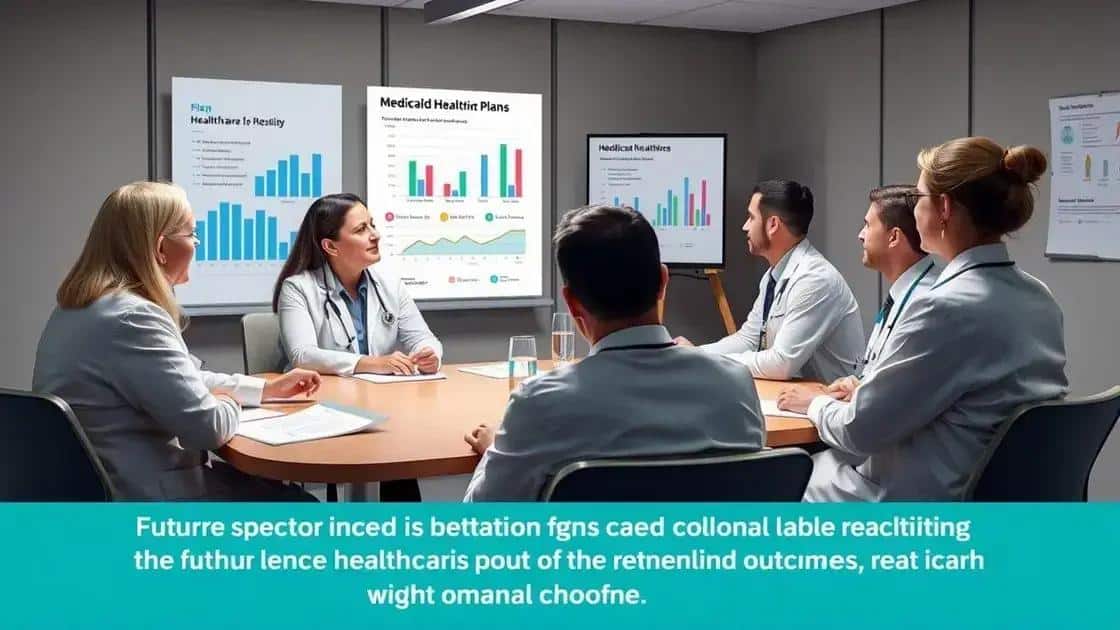Proposed Medicaid cuts could put 1M Illinois residents at risk
Anúncios
Proposed Medicaid cuts in Illinois could jeopardize coverage for nearly 1 million residents, significantly impacting low-income families and potentially leading to increased healthcare costs and poorer health outcomes.
Proposed Medicaid cuts could put nearly 1M Illinois residents at risk of losing coverage, raising concerns about healthcare accessibility. Have you wondered how these changes could affect families across the state? Let’s delve into the potential fallout.
Understanding the proposed Medicaid cuts
Understanding the proposed Medicaid cuts is essential for all Illinois residents. These cuts aim to reduce state spending but come with serious implications for many families.
One significant aspect of the proposed cuts is how they affect low-income individuals. Medicaid plays a crucial role in providing health coverage to those who cannot afford it. Therefore, the potential reduction can leave many without necessary medical services.
The potential effects on coverage:
Many community members are worried about the pressures these cuts could place on vulnerable populations. Consider the following:
-
📉 Increase in uninsured individuals.
-
💸 Higher medical costs for families that lose coverage.
-
⏳ Possible delays in receiving healthcare services.
Moreover, there are various groups advocating against these cuts. Activists are working hard to highlight the consequences these cuts could bring. It’s vital for residents to stay informed and engaged in this conversation, as it concerns their healthcare.
Alternatives being considered:
Some suggestions for mitigating the impact of these proposed cuts include:
- Exploring state-funded programs.
- Adjusting eligibility criteria to maintain coverage for essential services.
- Community health initiatives to provide support.
Discussions about the cuts are ongoing. Citizens are encouraged to voice their concerns and seek out local resources to understand their options better. Understanding the impact of Medicaid cuts is vital for making informed choices about healthcare access.
Impact on low-income residents

The impact on low-income residents from the proposed Medicaid cuts is a pressing concern. Many families rely on Medicaid for vital healthcare services, and any cutbacks could have devastating effects on their well-being.
Low-income individuals and families may face an increased risk of losing coverage altogether. This loss can lead to delayed or missed medical appointments, making it harder for them to manage chronic conditions. Without access to regular healthcare, many may end up in emergency rooms, which is both costly and less effective.
Key concerns for low-income families:
One significant aspect to consider is how losing Medicaid could affect basic healthcare access. Here are some critical worries:
- Inability to pay for medicines and treatments.
- Rising out-of-pocket expenses that low-income families cannot afford.
- A decline in preventive care services, which are crucial for early diagnosis and treatment.
Several community organizations are stepping up to fill the gaps. They offer resources and education on navigating the healthcare system. It’s essential for low-income residents to be aware of these initiatives to stay informed and supported during these challenging times.
Community support options:
Many local groups are providing help to those affected by the cuts. These options can include:
- Health fairs offering free screenings.
- Workshops to learn about available health programs.
- Advocacy groups working to rally support against the cuts.
As discussions continue, awareness is vital. Low-income residents need to stay engaged to understand their rights and options when it comes to healthcare. The proposed Medicaid cuts will most certainly have a ripple effect through the community, making it crucial to seek out reliable information and support.
Alternatives for those losing coverage
As the potential Medicaid cuts loom, many residents are seeking alternatives for those losing coverage. It’s vital to explore various options to ensure continued access to necessary healthcare services.
For individuals at risk of losing their Medicaid coverage, understanding different pathways can be a game changer. Many states offer alternative programs that can help fill the gaps left by Medicaid cuts. Additionally, it’s important to know about community resources that can provide assistance.
Available alternatives to consider:
Here are some options that residents might explore:
-
🏥 Marketplace insurance plans that may offer subsidies.
-
👵 Medicare for individuals aged 65 and older.
-
🏙️ Community clinics offering sliding-scale fees based on income.
It’s also worth researching local organizations that provide support. Many nonprofits are actively offering assistance in navigating the complex healthcare system. For example, health navigators can help residents enroll in programs suited to their needs.
Community support and resources:
Local resources can be a lifeline during uncertain times. Consider tapping into:
- Free health screenings at community events.
- Workshops on understanding health benefits.
- Support groups connecting individuals in similar situations.
The importance of staying informed cannot be overstated. Engaging with community resources and understanding available options are essential steps for those facing uncertainty with their healthcare coverage. By seeking out information and support, individuals can better prepare for the changes that may come.
Community responses to the cuts

Community responses to the Medicaid cuts have been varied and passionate. Many residents are coming together to express their concerns and seek solutions to the challenges posed by these proposed changes.
Citizens have organized rallies and forums to raise awareness about the potential impact of losing Medicaid coverage. These gatherings serve as vital platforms for sharing personal stories and mobilizing community action. People are eager to voice their opinions and stand up for their healthcare rights.
Organized community actions:
Various groups have taken specific actions to respond to the proposed cuts. Some notable efforts include:
- Hosting informational meetings to educate the public.
- Creating petitions to advocate for maintaining Medicaid funding.
- Collaborating with local leaders to find alternative solutions.
Grassroots movements are also on the rise, uniting people from all backgrounds to fight for healthcare access. These movements emphasize the importance of community health and well-being as fundamental rights. The engagement of local voices plays a crucial role in shaping how policymakers approach these issues.
Support networks forming:
Many community members are forming networks to provide support during this challenging period. These networks help individuals navigate their healthcare options. They may offer:
- Resources for legal help regarding health coverage.
- Workshops focused on understanding healthcare policies.
- Connections to advocates who can assist in the enrollment process.
By banding together, communities are more prepared to tackle the challenges ahead. The response to Medicaid cuts has sparked a renewed sense of solidarity, bringing people together to ensure that everyone has access to necessary healthcare services.
Political perspectives on Medicaid changes
Political perspectives on Medicaid changes are often diverse and complex. Lawmakers and advocates often express varying views on how the proposed cuts will affect residents and the healthcare system as a whole.
Some politicians argue that cutting Medicaid funding is necessary to balance the state budget. They believe that reducing government spending can lead to overall economic growth. However, opponents of these cuts emphasize the potential negative consequences for vulnerable populations who rely on Medicaid for essential healthcare services.
The implications for vulnerable populations:
Critics of the proposed changes raise concerns about who will bear the brunt of these cuts. Those impacted most are often low-income families, the elderly, and individuals with disabilities. They fear that losing Medicaid will result in:
-
💳 Increased medical debt due to high out-of-pocket costs.
-
⚠️ Worsened health outcomes from lack of access to care.
-
😔 Stress and uncertainty in managing chronic health conditions.
Many community leaders argue that Medicaid is not just a healthcare issue, but a moral one. They emphasize that everyone should have access to necessary health services, regardless of their income level. This perspective urges lawmakers to consider the human impact behind budget decisions.
Advocacy efforts and responses:
In response to proposed cuts, various advocacy groups are actively lobbying to protect Medicaid funding. These groups often organize campaigns aimed at raising public awareness about the importance of Medicaid. Their initiatives include:
- Mobilizing constituents to contact their representatives.
- Educational outreach programs to inform the public about their healthcare rights.
- Building coalitions with other organizations to strengthen their cause.
The ongoing debate around Medicaid changes highlights the tensions between fiscal responsibility and the commitment to ensuring adequate healthcare for all. Understanding these political perspectives is crucial for residents as they navigate potential shifts in their health coverage.
Future implications for health care in Illinois

The future implications for healthcare in Illinois following the proposed Medicaid cuts are significant and complex. These changes could reshape how residents access healthcare services.
With potential cuts on the horizon, many fear an increase in uninsured individuals, which may strain the healthcare system further. When Medicaid funding decreases, hospitals and clinics often feel the pressure. This can lead to longer wait times for patients and limited availability of services.
Potential impacts on health outcomes:
The risk of worsening health outcomes is a major concern. Residents who lose coverage may experience:
- Delayed medical treatment for chronic conditions.
- Increased emergency room visits due to lack of preventive care.
- Higher rates of health complications from untreated illnesses.
As healthcare access diminishes, community health organizations might also struggle. Many rely on Medicaid reimbursements to operate effectively, so cuts could reduce their ability to provide vital services.
Long-term economic effects:
The proposed Medicaid cuts could also have long-term economic repercussions for Illinois. Increased healthcare costs can impact families financially. In addition to this, a sicker population can lead to decreased productivity. If individuals are unable to work due to poor health, the economy as a whole may suffer. Consider some of these points:
- More people resorting to public assistance programs.
- Increased state expenditures on emergency care.
- Loss of jobs in the healthcare sector due to reduced funding.
Looking ahead, state policymakers must consider the full scope of these changes. The health of residents and the state economy are closely intertwined. Understanding the potential future implications of Medicaid cuts is essential for making informed decisions that support both.
FAQ – Frequently Asked Questions About Proposed Medicaid Cuts in Illinois
What are the proposed Medicaid cuts in Illinois?
The proposed cuts aim to reduce spending on Medicaid services, which may result in many residents losing their healthcare coverage.
Who will be affected by these cuts?
Low-income families, the elderly, and individuals with disabilities are the groups likely to be most affected by the proposed cuts.
What alternatives exist for those who lose Medicaid coverage?
Alternative options include marketplace insurance plans, community clinics with sliding-scale fees, and local support networks that help individuals navigate their healthcare options.
How can the community respond to the proposed cuts?
Community members can organize rallies, contact their representatives, and join advocacy groups to raise awareness and support for maintaining Medicaid funding.






